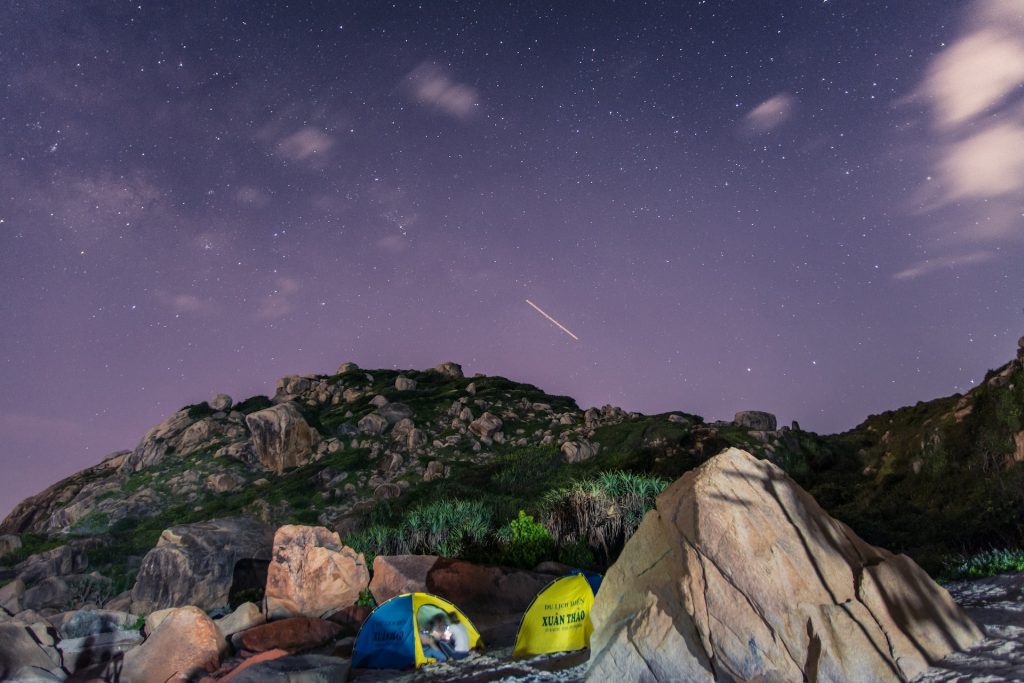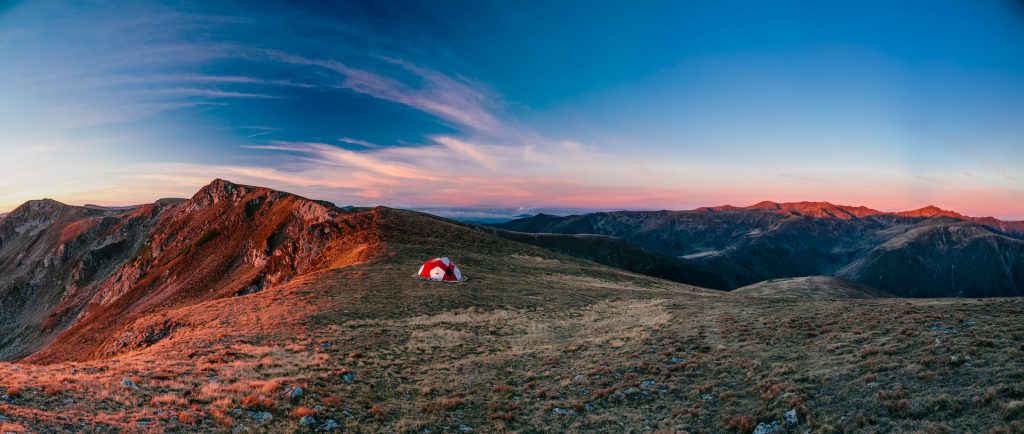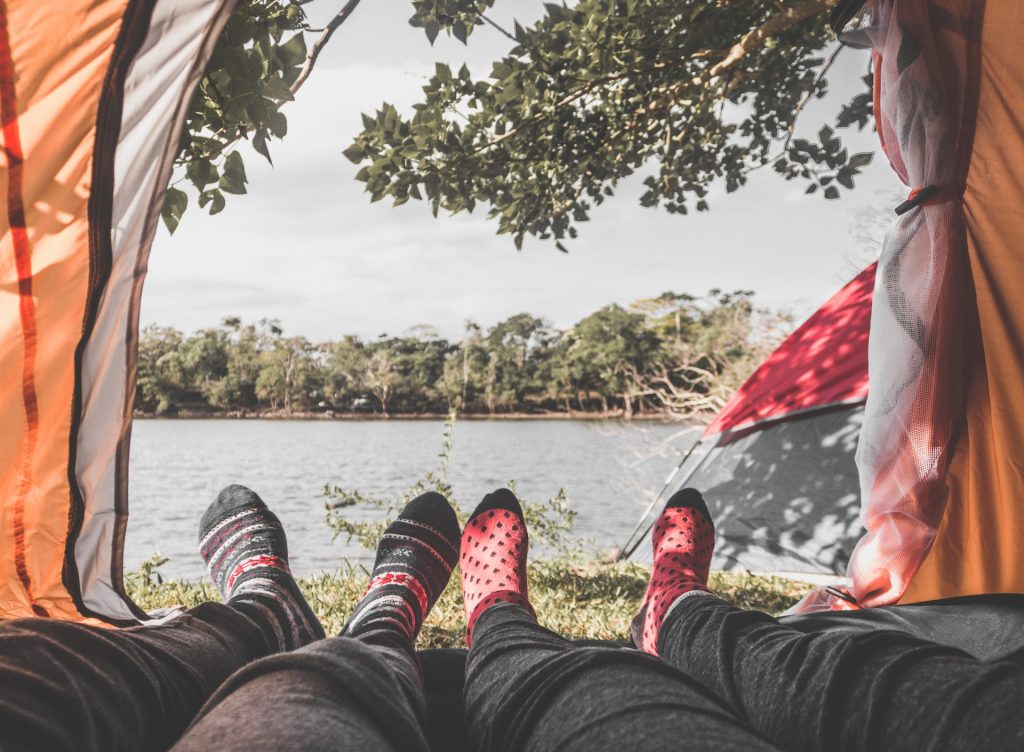If you’re thinking of taking your kids on their first family camping adventure, here’s what you should know
I hated everything about the outdoors as a kid. Bugs. Dirt. Poison Ivy. No showers. No Wi-Fi. Did I already mention the bugs? When I was young, family camping was at the very bottom of my family vacation ideas list.
But the first time I camped out with my Girl Scout troop, I forgot about all of that in the glow of sing-a-longs and friendship bracelets—at least until I innocently asked my troop leader, “Um, where are the bathrooms?” Our troop of 10-year-olds nearly led a revolt when we learned there weren’t any.

Of course, once I got over the initial shock, I realized that roughing it is all part of the fun. I quickly forgot about the inconveniences of camping once we started exploring nearby trails and watched the sunrise kiss the ocean for the first time. We told scary stories and bad jokes , roasted marshmallows, learned how to navigate with compasses, and made cinnamon rolls in a solar oven.
I fell in love with camping right then and there, and now I spend summers hiking across Maine, taking spring breaks at Utah’s national parks , and saving up for trekking adventures in Patagonia and Iceland.
If you’re thinking of taking your kids on their first family camping adventure—or just want to get away yourself—here’s what you should know.
Family Camping Basics
First thing’s first: If you plan on taking your family out into the wilderness (even relative wilderness), make sure you know basic camping skills like first aid, fire and outdoors safety, wildlife awareness, how to filter water, and Leave No Trace etiquette. Not only will those skills come in handy, you’ll show your kids how to be stewards of our environment and public lands.
To get up to speed on these basic camping skills, look for courses from your local parks and recreation department, connect with organizations like the National Outdoor Leadership School (NOLS) or Outward Bound , or sign up for classes and workshops at outdoor outfitters like L.L. Bean or REI.
You’ll also want to make sure to stay up-to-date on COVID-19 regulations and guidelines as you plan your trip. Some states still require quarantine or negative tests for non-vaccinated travelers crossing state lines, and since it’s likely children under 12 won’t be eligible for vaccinations until 2022, make sure you’re also practicing social distancing and carrying a stash of masks, wipes, and hand sanitizer.All that said, your first family camping trip should be something you’re completely confident about doing. You don’t have to—and probably shouldn’t—venture into the deep wilderness to have a great first family camping trip. As a beginner, it’s better to aim for the relative wilderness of a family campground or other controlled area.
All that said, your first family camping trip should be something you’re completely confident about doing. You don’t have to—and probably shouldn’t—venture into the deep wilderness to have a great first family camping trip. As a beginner, it’s better to aim for the relative wilderness of a family campground or other controlled area.
Essential Gear for Family Camping
Where I often camp in New England, the saying goes: “If you don’t like the weather, wait a few minutes.” That also means no matter what time of year I’m camping, I always have certain gear with me. Of course, when I’m backcountry camping and hauling all my own gear, I pare things down. But with frontcountry camping or traveling in an RV or van, you can easily bring enough creature comforts to get a good night’s sleep.

Tent, tarp, and waterproof cover or mesh netting. If you’re not sure how to set up your tent, head to an outdoor outfitter or YouTube for some demos.
Warm sleeping bag, sleeping pad, and inflatable mattress. Sleeping bags have different grades based on temperature. I tend to purchase 30 degrees or below since I’m a cold sleeper, but if it’s a hot summer night, you can get away with a lighter bag or even a blanket. Bring towels and extra blankets for cooler nights, too.
Camping hammock or camp chairs for hanging out. Whatever activities you’re planning for your family camping trip, consider heading back to camp while there’s plenty of light out. You can get the lay of the land, start a fire, set up the tent, and get everyone ready for bed without stumbling around in the dark. Camp chairs are especially important for sitting around the fire or if there are no picnic tables on site.
Flashlights, lanterns, and head lamps. There are obvious practical reasons for these, but you’ll also want them for staying up late telling spooky stories.
Extra toilet paper and paper towels. Bring a little more than you think you’ll need. You won’t regret it.
Extra trash bags. You’ll need these to carry everything out, and they also come in handy when you need to keep things separate and dry.
also tend to go big on meals, since everything tastes better in front of a campfire. Many frontcountry sites have grills or fire pits, meaning you can cook right over an open flame. Note that some parks don’t allow fires, especially in the Southwest and California, so be sure to read the rules and regulations carefully before you choose your family camping spot.






